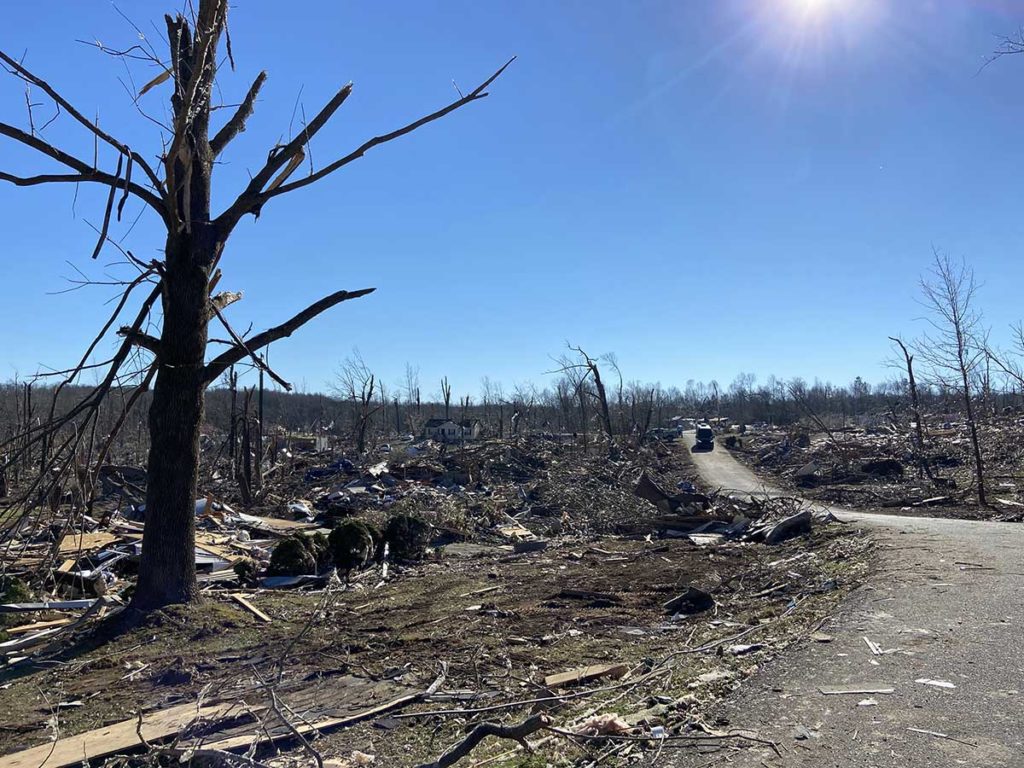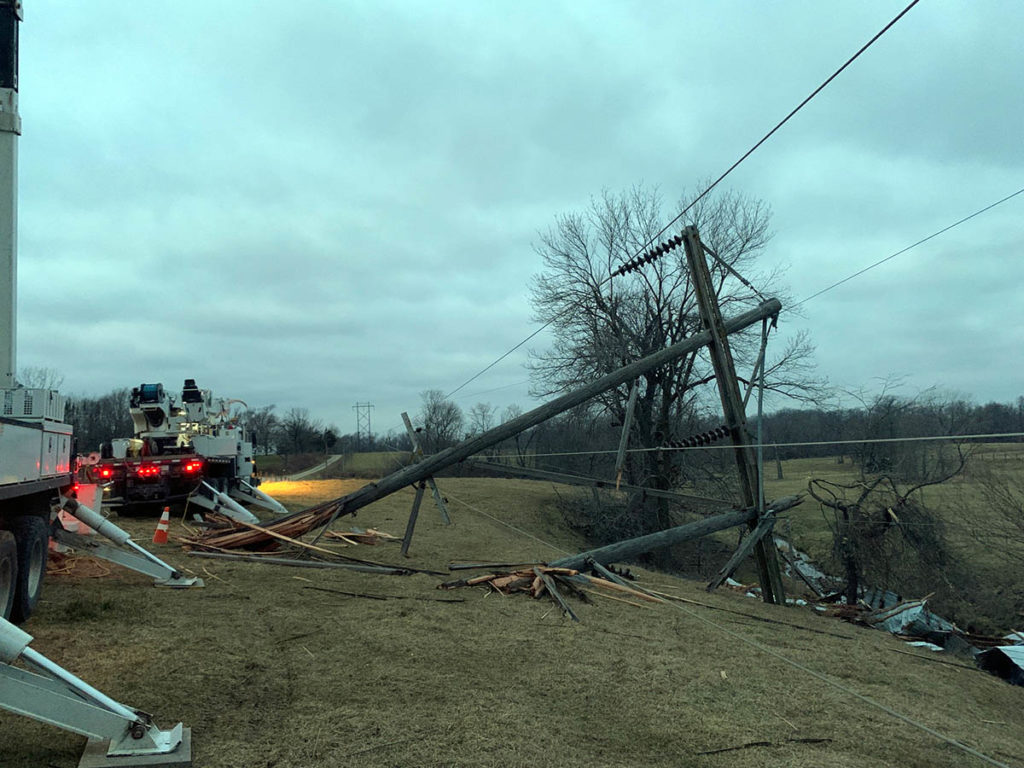
Updated: Dec. 16, 3 p.m. ET
While electric cooperatives in tornado-ravaged states in the South and Midwest were continuing to repair damage from last weekend’s deadly twisters, co-ops in other Midwestern states reported thousands of new power outages Thursday from destructive winds, thunderstorms and tornadoes that swept from the Rockies to the Great Lakes.
In Iowa, about 6,200 co-op consumer-members were without electricity as of Thursday afternoon, said Erin Campbell, communications director for the Iowa Association of Electric Cooperatives. The co-ops reporting the greatest number of outages were Midland Power Cooperative, which had more than 2,100 members without power, Prairie Energy Cooperative, with about 1,000 outages, and Woodbury County Electric Cooperative, with about 900 outages. The total number of outages was down dramatically Thursday from a peak of 22,500 on Wednesday night.

“From what we are hearing, destruction is truly widespread and the damage to electrical equipment has come from various causes: straight-line winds, tornadic activity, flying debris, and trees, branches and limbs,” Campbell said.
“There are reports of many broken and damaged poles—both distribution poles and transmission poles…Electric cooperatives from unaffected areas in the state are sending resources and crews over to impacted co-ops when requested to assist in the restoration effort. IAEC is assisting with coordinating these mutual aid efforts.”
Meanwhile, cooperative crews, mutual aid workers and contractors made significant progress this week in restoring electricity in six states following the deadly tornadoes that swept through parts of the South and Midwest over the weekend.
Damage to distribution and transmission lines, poles and support structures in some areas is extensive, and several co-op-served communities will face months of rebuilding and recovery from the massive tornadoes and powerful winds that ravaged their communities.
More than 100,000 co-op-served meters were out of service in the immediate aftermath of the weekend tornadoes, but local crews and contractors began assessing damage and making repairs as soon as winds subsided enough for them to work safely.
In hard-hit Kentucky, co-ops faced devastation in the communities they serve as they worked to restore power “surrounded by debris, destruction and an uncertain future for the western Kentucky communities they call home,” the Kentucky Electric Cooperatives said in a statement.
“Our hearts are heavy with the loss of life, homes, businesses and livelihoods in our communities,” said Chris Perry, president and CEO of Kentucky Electric Cooperatives and United Utility Supply Cooperative.
At least 75 people have died in Kentucky as a result of the tornadoes, state officials said Thursday.
“The co-op mission is to improve the quality of life in the communities we serve, and co-op crews are doing what they can to try to help our members recover from this disaster,” Perry said. “I want to personally thank the crews for their incredible response within such a short time.”
More than 500 workers were helping to restore power in western Kentucky. Crews from more than 20 co-ops in several states were assisting line technicians at West Kentucky RECC, Warren RECC, Gibson EMC and Pennyrile Electric, the statewide association said.
More than 80,000 co-op consumer-members in the state lost power Saturday. By Thursday afternoon, that number had dropped to about 5,400. However, the pace of restoration is likely to slow as co-op crews deal with the most heavily damaged areas, the statewide association said.
Kentucky co-op employees were among those who suffered severe damage to their homes. The statewide association has created the nonprofit Kentucky Rural Electric Disaster Fund to help them and the communities they serve.
“Time and time again, Kentucky electric cooperative employees put their personal lives and families on the side to address the needs of their communities and the wider co-op community,” Perry said.
Louisville-based United Utility Supply Cooperative delivered multiple truckloads of materials and supplies to affected co-ops, deploying office staff to join the co-op’s truck drivers and deliver extra loads as needed, said Joe Arnold, vice president of strategic communications for the statewide association.
“Aware of the forecasts for severe weather on Friday night, UUS worked with its transformer vendor, ERMCO, to secure an extra supply of transformers to be able to deliver them where they were most needed after the storms,” Arnold said. “Despite supply chain concerns, UUS has been able to deliver needed supplies to co-ops.”
In Tennessee, crews from neighboring co-ops worked to help Gibson Electric Membership Corp. restore power to hard-hit areas of northwest Tennessee and southwest Kentucky. The co-op had restored power to all reported outage locations as of Wednesday night.
“Even in the face of tragedy, it is encouraging to see how many rush to provide assistance when neighbors need help,” said David Callis, executive vice president and general manager for the Tennessee Electric Cooperative Association.
Gibson EMC employees were shaken by the devastation.
“It hit home,” Jason Mills, line foreman for Gibson EMC’s Tiptonville office, said in a news release. “The loss of life hurts. That makes this one a little different.”
In Arkansas, 8,000 co-op members were out of power initially, but that number had plummeted to about 25 as of Thursday afternoon, according to the outage map on the website of the Electric Cooperatives of Arkansas.
In Missouri, crews worked Monday to repair a high-voltage transmission line connecting two power plants owned by Springfield-based Associated Electric Cooperative to the grid. The G&T lost 17 steel structures, and officials have said long-term repairs will be needed on the line. As of Thursday afternoon, the Association of Missouri Electric Cooperatives’ outage map showed about 500 co-op members without power.
Co-op crews also repaired outages to several thousand co-op meters in Mississippi and Illinois over the weekend, and power had been completely restored by Tuesday.
Erin Kelly and Derrill Holly are staff writers for NRECA.